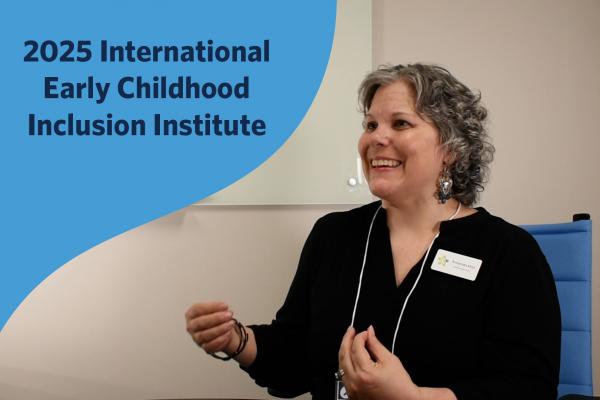
Reflections from the 25th International Early Childhood Inclusion Institute: Amanda Kloo
What can happen when a child with disabilities is included in a traditional care setting with their peers without disabilities―where they can interact, learn, and play together in a universally designed environment, with adaptations, modifications, or accommodations built to support their full participation? For decades, the UNC Frank Porter Graham Child Institute (FPG) has led the way, proving that with the right institutional support, technical assistance, professional development, implementation, and advocacy, young children both with and without disabilities thrive in remarkable ways when they’re in inclusive environments.
Earlier this year, the International Early Childhood Inclusion Institute celebrated a quarter-century of FPG’s longstanding work in early childhood inclusion. Presentations and discussions at the event recognized the voices and experiences of children with disabilities and their families and highlighted the critical contributions of individuals with disabilities, families, practitioners, policymakers, and many other leaders in the field who have worked tirelessly to create more inclusive environments.
We had a chance to speak with some of this year’s presenters and attendees and will be sharing those conversations with you in a short series of articles over the coming weeks. In this article, you’ll hear from Amanda Kloo, director of inclusive recreation at the National Inclusion Project. We’re so glad she made time to speak with us during the conference.
Tell us about yourself, what you do, and what brings you to the Inclusion Institute.
I'm Amanda Kloo. I'm the director of inclusive recreation at the National Inclusion Project, and I am a proud person with a disability, as well as a mom of a child with disabilities. So, I've been working in special education or disability related fields for really long time. I've been doing this for about 30 years now, and the work here has been a powerful and influential part of how I do what I do and why I do what I do.
What were you most looking forward to sharing as part of your presentation?
I was most looking forward to my sessions that focus in on inclusive play because I love to have fun, I love to play with kids, and I think play is an essential part of classroom practice that is often ignored. . It’s a great friendship builder for inclusion as well as learning builder for inclusion. And it has a really powerful and important impact on how kids learn and grow and discover. And we need to play more as adults and grownups too, so it's the perfect thing to embed into instructional practice.
Why was it important for you to share your work at this particular conference?
I was honored to be invited and supported in presenting at this year's conference—in particular in celebrating 25 years of really crucial work for advancing best practice in inclusion and special education and working with young children, and at institutes in the past—because this conference is a great mouthpiece as well as pathway for practitioners at all different levels of professional skill to make sure that we're providing what kids need when they need it. So that as they grow and age out of their early childhood experience, they still have those connections and those relationships and those opportunities to engage together instead of separately.
What is one key takeaway would like to share about early childhood inclusion?
I really believe as a professional and as a person that we should all be working toward working ourselves out of this job so that in five years or ten years or 15 years, we no longer need to educate about inclusion because inclusion just is. And it gives me chills to think about what it is that a child's worldview would be to simply know that they can be who they are and supported for who they are no matter what. Because that's just the norm, not the different.
You can watch a video of Kloo's interview on our YouTube channel.
